How Long Does Fresh Juice Last
Fresh juice's shelf life depends on your juicing method and storage practices. If you're using a slow masticating juicer, your juice can last up to 72 hours when properly refrigerated at 35-40°F, while centrifugal juicer output should be consumed within 24 hours due to faster oxidation. Store your juice in airtight glass containers, filling them to the rim to minimize air exposure, and keep them in the back of your refrigerator for consistent temperature. You'll know your juice has spoiled if you notice color changes, separation that won't remix, unusual cloudiness, or fermented smells. Understanding proper storage techniques can help you maximize your juice's freshness and nutritional benefits.
This post may contain affiliate links. If you make a purchase through these links, I may earn a commission at no additional cost to you. Additionally, portions of this post may be generated using artificial intelligence (AI) technology. While we strive for accuracy, please be aware that AI-generated content may not always be perfect and should be fact-checked when necessary.
The Spatula Scoops
- Fresh juice from a slow masticating juicer lasts up to 72 hours when stored properly at 35-40°F in the refrigerator.
- Juice made with a centrifugal juicer should be consumed within 24 hours due to faster oxidation rates.
- Store-bought pasteurized juices can last weeks to months, while cold-pressed commercial juices typically last 3-5 days.
- Signs of spoiled juice include color changes, unusual separation, fermented smell, bubbles, and bloated containers.
- Freezing fresh juice can significantly extend its shelf life when stored with proper headspace at 0°F.
Home Juicing Storage Times
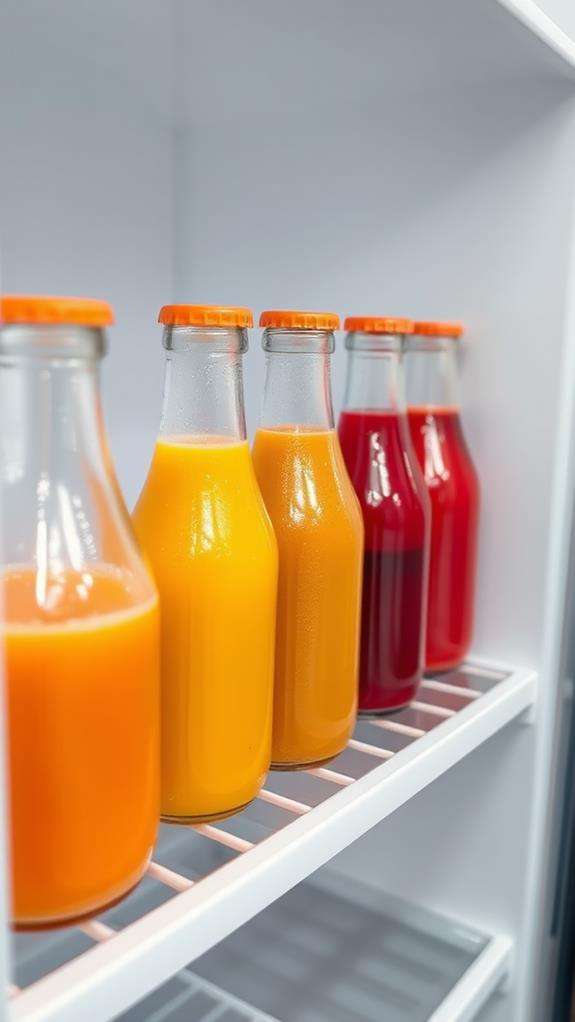
Freshness is the key factor in determining how long your homemade juice will last. When you're storing juice from your own juicer, you'll need to take into account several important variables, including the storage container, temperature, and juice type.
For ideal freshness, you'll want to store your fresh-pressed juice in an airtight, glass container that's been properly sanitized. If you're using a slow masticating juicer, your juice can last up to 72 hours when properly refrigerated at 35-40°F (1.6-4.4°C). However, if you're using a centrifugal juicer, you'll need to consume your juice within 24 hours due to the higher oxidation rate from the fast-spinning blades.
You can extend your juice's shelf life by filling the container to the very top, minimizing air exposure, and adding a few drops of lemon juice as a natural preservative. It's important to remember that different ingredients affect storage time differently – leafy green juices typically degrade faster than fruit-based ones. You'll know your juice has gone bad when you notice separation, off-colors, unusual smells, or a fizzy texture.
Signs Your Juice Has Spoiled
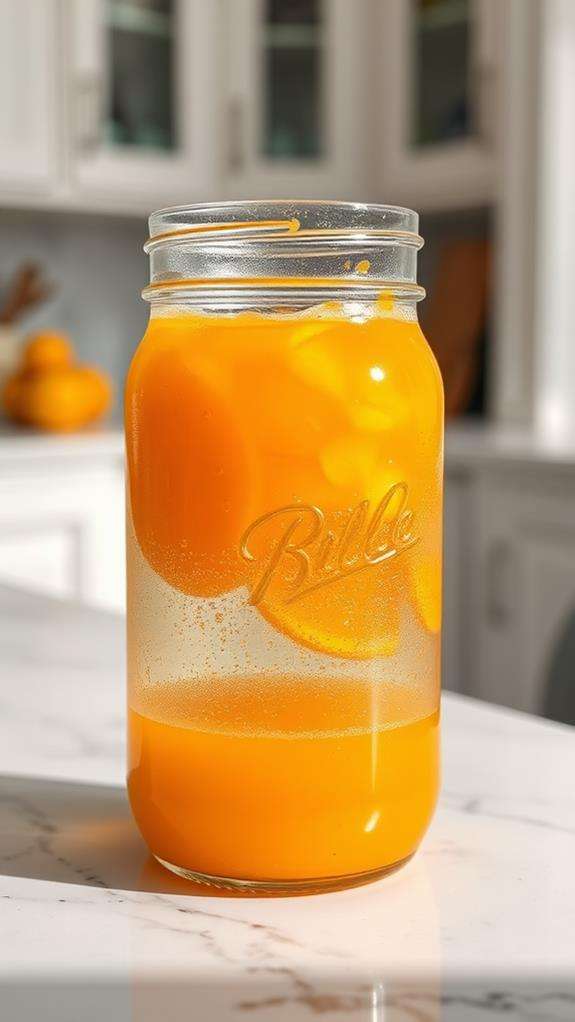
Warning signs of spoiled juice are unmistakable and can protect you from consuming unsafe beverages. When you check your juice, look for changes in color, as oxidation often causes browning or darkening, especially in apple, pear, or citrus juices. You'll also notice an unpleasant, fermented smell that's distinctly different from the juice's natural aroma.
Visual indicators include separation that won't remix when shaken, unusual cloudiness, or the presence of mold, which appears as fuzzy spots in white, green, or black colors. If you see bubbles forming when the juice hasn't been moved, it's likely starting to ferment. The container might also appear bloated or feel pressurized when you attempt to open it.
The taste will be your most obvious indicator – if your juice tastes fizzy, vinegary, or just "off," don't drink it. You might notice a slight burning sensation on your tongue or an acidic aftertaste. Any sliminess in texture or chunks that weren't present when you first juiced are definite red flags. When in doubt, it's better to discard suspicious juice than risk foodborne illness.
Proper Storage Methods

Three essential storage methods can enhance your fresh juice's lifespan. First, you'll want to store your juice in an airtight, preferably glass container that's been thoroughly sanitized. Glass containers prevent chemical leaching and maintain the juice's integrity better than plastic alternatives. Fill the container to the very top to minimize oxidation-promoting air pockets.
The second method involves temperature control. You should refrigerate your juice immediately after pressing, maintaining a consistent temperature between 35-38°F (1.6-3.3°C). The colder environment notably slows down bacterial growth and enzymatic reactions that lead to spoilage. If you're planning to store juice for more than a day, consider using the third method: freezing. You'll need to leave about an inch of headspace in your container, as juice expands when frozen.
For ideal results, you should label your containers with the pressing date and contents. When using the freezer method, don't forget to transfer frozen juice to the refrigerator 24 hours before you plan to consume it. This allows for proper thawing while maintaining the juice's nutritional benefits and taste profile.
Store-Bought Versus Fresh Juice
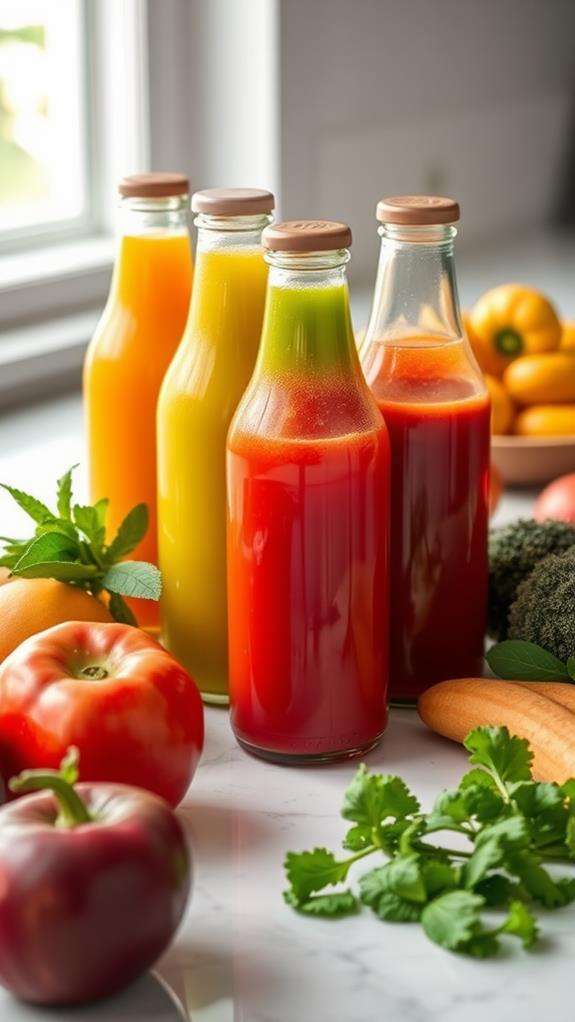
When you're comparing store-bought and fresh juices, you'll notice significant differences in their shelf life due to commercial processing methods, including pasteurization, preservatives, and specialized packaging techniques. Your homemade fresh juice, while more nutritionally vibrant, typically lasts only 24-72 hours in the refrigerator, whereas commercially processed juices can remain safe to drink for weeks or even months when unopened. The extended shelf life of store-bought juice comes from high-pressure processing (HPP) and heat pasteurization, which eliminate harmful bacteria but may affect the juice's natural flavor and nutritional content.
Shelf Life Differences
Store-bought juices boast considerably longer shelf lives than their freshly squeezed counterparts, thanks to commercial pasteurization and preservatives. You'll find these processed juices lasting anywhere from 6 months to a year when unopened, while maintaining quality for 7-10 days in your refrigerator after opening. The preservation process, while reducing some nutritional value, guarantees stability and food safety through methods like thermal processing and the addition of natural preservatives.
Fresh-pressed juices, however, follow a different timeline. When you make juice at home, you'll need to consume it much more quickly, ideally within 24-48 hours, even when refrigerated properly at 40°F (4°C) or below. Cold-pressed juices from local vendors typically last 3-5 days due to their specialized extraction methods and careful handling procedures. If you're using a centrifugal juicer at home, you'll want to drink your juice even sooner, as the heat and oxidation from the juicing process can accelerate nutrient degradation and bacterial growth. Storage containers also play a significant role – using airtight, glass containers can help extend your fresh juice's viability by reducing oxidation.
Processing and Preservation Methods
Processing methods mark the key distinction between commercial and fresh juices. When you're choosing between store-bought and freshly squeezed juice, you'll notice significant differences in how they're prepared and preserved. Commercial producers use pasteurization, high-pressure processing (HPP), and preservatives to extend shelf life, while fresh juices rely on simple extraction methods.
| Method | Store-Bought Juice | Fresh Juice |
|---|---|---|
| Heat Treatment | Pasteurized at 185°F | No heat applied |
| Preservation | Chemical additives | None needed |
| Processing Time | Hours to days | Minutes |
| Shelf Life | 6-12 months sealed | 24-72 hours |
You'll find that commercial processing involves multiple steps: filtration, heat treatment, and chemical stabilization. These steps guarantee longer shelf life but can diminish nutritional value. In contrast, when you make fresh juice at home, you're using a single-step extraction that maintains maximum nutrient content. The trade-off is clear: convenience and longevity versus nutritional integrity. While store-bought juices offer practicality, they can't match the enzymatic activity and vitamin content of freshly pressed alternatives.
Extending Fresh Juice Life
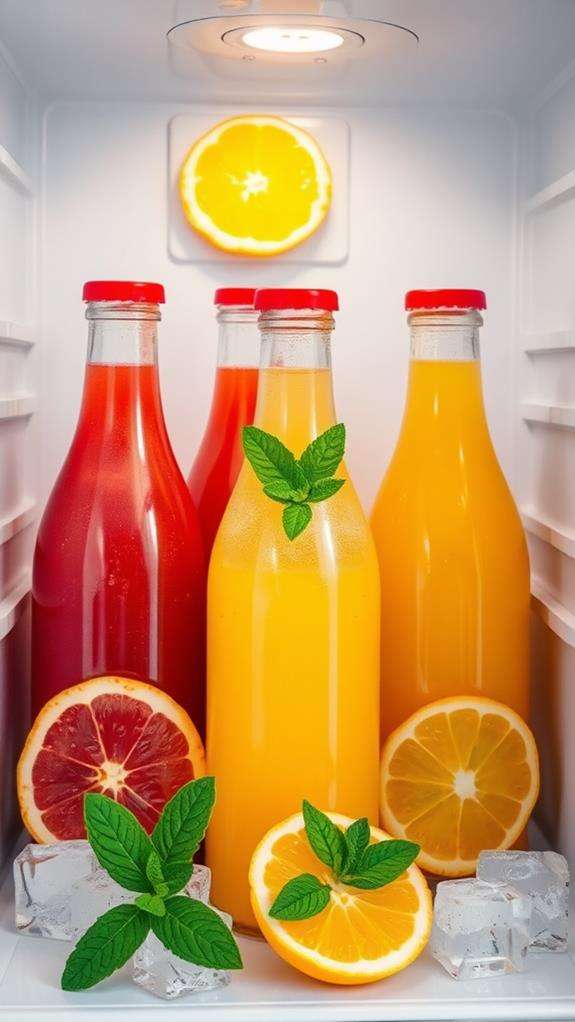
You'll get the most out of your fresh juice by starting with the right storage container, ideally using glass or BPA-free plastic containers that minimize exposure to light and air. Maintaining proper temperature control, specifically keeping your juice between 35-38°F in your refrigerator's crisper drawer, stands as your most powerful tool for preservation. To create an effective barrier against oxidation, which rapidly degrades juice quality, you should employ air-tight sealing methods like vacuum-sealed containers or mason jars with rubber gaskets, filling them to the very top to eliminate air pockets.
Proper Storage Container Selection
The longevity of fresh juice heavily depends on choosing the right storage container. You'll want to select materials that prevent oxidation and maintain freshness while protecting your juice from harmful bacteria.
| Container Type | Best Usage Scenarios |
|---|---|
| Glass Mason Jars | Daily storage, refrigeration |
| Stainless Steel | Travel, temperature control |
| BPA-free Plastic | Short-term storage only |
| Vacuum-sealed | Long-term preservation |
When selecting your container, you'll need to take into account several significant factors. First, confirm it's airtight to prevent oxidation, which can quickly degrade your juice's nutrients. Second, choose a container that's appropriately sized – you don't want excess air space that could accelerate spoilage. UV-protected containers are ideal if you're storing juice for longer periods, as light exposure can diminish vitamin content.
You should always fill your container to the very top, leaving minimal air space. This practice reduces oxidation and helps preserve the juice's fresh taste and nutritional value. If you're using mason jars, think about purchasing oxygen absorber packets to place beneath the lid, which can extend shelf life by up to 72 hours.
Temperature Control Matters Most
While proper storage containers protect your juice, maintaining the right temperature plays an even bigger role in preservation. You'll want to keep your fresh juice at or below 40°F (4°C) at all times, as this markedly slows down the oxidation process and inhibits bacterial growth.
Your refrigerator's main compartment typically maintains the ideal temperature range, but you shouldn't store juice in the door compartments, where temperatures fluctuate each time you open the fridge. Instead, place your juice containers toward the back of the middle shelf, where temperatures remain most stable.
If you're planning to transport your juice, you'll need to use an insulated container or cooler with ice packs. Don't let your juice sit at room temperature for more than 30 minutes, as this accelerates nutrient degradation and increases the risk of spoilage. For longer storage periods, you can freeze your juice at 0°F (-18°C), though this may slightly impact texture and nutritional value. When you're ready to consume frozen juice, thaw it gradually in the refrigerator rather than at room temperature to maintain safety and quality.
Air-Tight Sealing Methods
Properly sealing fresh juice creates a critical barrier against oxidation and contamination. When you're storing your freshly pressed juice, you'll need to select containers that provide an airtight seal to maximize shelf life and maintain nutritional value. Glass mason jars with rubber-sealed lids or specialized juice bottles with vacuum-seal capabilities offer the best protection against environmental factors that can degrade your juice's quality.
- Fill your container to the very top, leaving minimal headspace (about 1/4 inch) to reduce contact with oxygen, which can accelerate nutrient breakdown and affect taste
- Use food-grade silicone or rubber gaskets on your container lids, ensuring they're clean and free from cracks that could compromise the seal
- Consider vacuum-sealing methods, such as using a vacuum pump attachment or commercial vacuum sealer, which can remove up to 99% of air from your juice container
If you're using screw-top containers, make sure to tighten them firmly but not excessively, as over-tightening can damage the threads or gaskets. When possible, opt for dark-colored or UV-resistant containers to protect your juice from light exposure, which can degrade both nutrients and flavor compounds.
Best Juicing Preservation Techniques
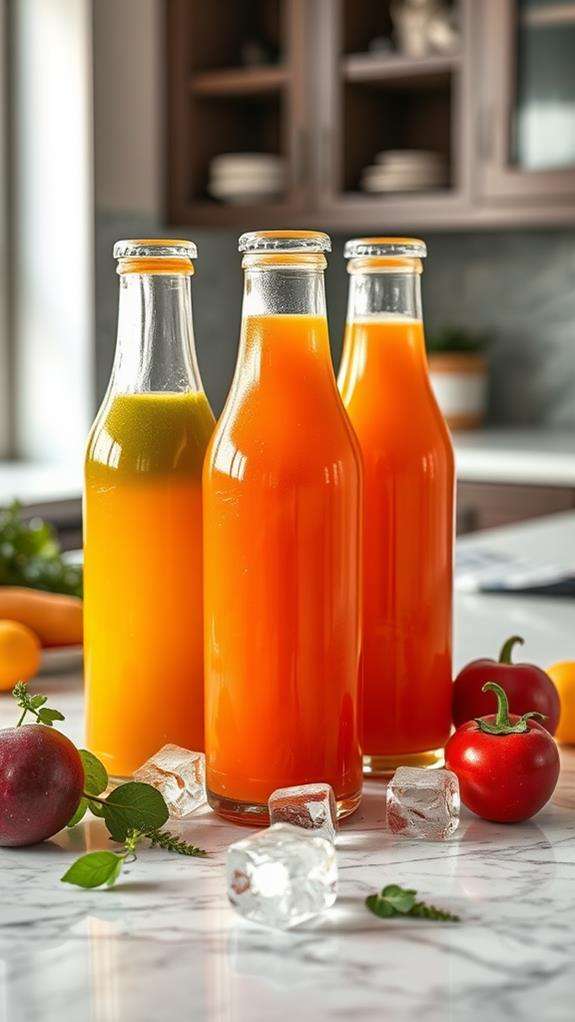
Keeping your fresh juice at its best requires implementing several proven preservation methods. You'll want to start by using a cold-press juicer instead of a centrifugal one, as it minimizes oxidation and heat exposure during the extraction process. This method helps preserve enzymes and nutrients longer.
Store your juice in glass containers rather than plastic ones, as glass doesn't leach chemicals or retain odors. You'll need to fill these containers to the very top, leaving minimal air space, which reduces oxidation. Adding a few drops of lemon juice to your freshly pressed beverages can help maintain color and extend shelf life through natural preservation.
Temperature control is essential – keep your juice at 41°F (5°C) or below in your refrigerator's colder sections. If you're planning for longer storage, consider investing in a vacuum sealer system that removes air from specialized juice containers. You can also try freezing portions in ice cube trays, though you'll want to consume these within two months. Remember to label each container with the date you made the juice, and always use the first-in-first-out method when storing multiple batches.
Frequently Asked Questions
Can I Freeze Fresh Juice in Ice Cube Trays?
Like nature's colorful gems waiting to be preserved, you can absolutely freeze fresh juice in ice cube trays. You'll want to leave a bit of space at the top since liquids expand when frozen. Once frozen, transfer your juice cubes to freezer bags, and they'll keep for up to 6 months. You can pop these cubes into smoothies, use them as natural drink chillers, or thaw them for regular juice. Just remember, some separation's normal after thawing.
Do Different Fruits Affect How Quickly Juice Goes Bad?
Yes, different fruits definitely affect how quickly your juice spoils. You'll find that high-acid fruits like citrus and pineapples naturally last longer due to their acidic content, which helps fight bacteria growth. Meanwhile, low-acid fruits like apples and pears tend to spoil faster. Your watermelon and berry juices are particularly quick to ferment because of their high sugar content and water composition. You'll want to consume these more delicate juices within 24 hours.
Should I Strain Pulp Before Storing Fresh Juice?
You bet your juicer should strain that pulp – it's like giving your juice an Instagram filter for longer freshness! When you remove pulp, you're eliminating fiber and particles that can speed up oxidation and bacterial growth. You'll get a clearer juice that'll last 24-48 hours longer in your fridge. However, if you're drinking the juice immediately, keeping the pulp is fine since it contains beneficial nutrients and fiber.
Can I Mix Different Juices Together for Storage?
Yes, you can mix different juices together for storage, but you'll want to take into account a few key factors. First, verify the fruits have similar shelf lives, as mixing long-lasting juices with quick-spoiling ones will reduce overall storage time. Also, take into account flavor compatibility – citrus juices often pair well together, while strong-flavored vegetables like beets might overpower milder ingredients. It's best to mix juices you'll consume within the same timeframe.
Does Juicing Ripe Versus Unripe Produce Affect Shelf Life?
You'll find that ripeness definitely impacts your juice's shelf life! When you juice unripe produce, you'll get less sugar content and more bitter compounds, which can actually help your juice last slightly longer. However, ripe fruits and vegetables give you the best nutritional benefits and flavor. The higher sugar content in ripe produce means your juice might spoil a bit faster, usually cutting shelf life by 12-24 hours compared to juice from unripe produce.





